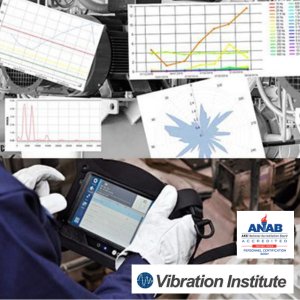

An introduction and background to Basic Vibration, Sensors, Instrumentation, Measurements, Conversion of Measurements, Analysis Techniques, Balancing, Machine Condition and Evaluation.
There is a workshop supporting each chapter. The student will test their knowledge and understanding of the material presented for that chapter by completing the workshops during the time allowed in class. The instructor will then review the workshop with the class. The student’s time and understanding of the workshop materials will aid them in their preparation for the certification exam.
Basic Machinery Vibration: Units, Properties, Measurements, Motions, Time, Excitation, Critical, Speeds, Frequency, and Amplitude.
Data Acquisition: Selecting a Measure, Transducers, Frequency Spans, Data Displays, and Calibration.
Data Processing: Instruments, Sampling, Aliasing, Windows, Dynamic Range, Averaging, Analyzer Set-up, and Filters.
Fault Diagnostics: Techniques, Operating Speed, Rolling Element Bearings, Gearboxes, Motors, Pumps, Fans, and Compressors.
Condition Evaluation: Shaft Vibration, Bearing Vibration, Casing Vibration, Historical Data Base, Charts and Graphs.
Machine Testing: Equipment, Site Inspection, Acceptance Testing, Baseline Development, Transient Testing, Presentation of Data and Reports
Periodic Monitoring: Listing Assets, Categorizing Priorities, Route Selections, Measurement Points, Frequency of Data Collection, Reporting of Results.
Single Plane Balancing: Type of Unbalance, Balancing Equipment, Pre-balancing Checks, Measurements, Trial Weights, Vector Method and Balancing Solution.
BMV prepares attendees to perform basic vibration analysis on industrial machinery using single-channel measurements, with or without trigger signals, according to established and recognized procedures. It covers basics of sensors, database and data collector setup, data collection, signal processing, fault analysis, and basics of single plane balancing. It is partial preparation for the Vibration Analyst Category II Certification Exam. The workshops and demonstrations scheduled throughout the training course are used to illustrate theory and applications.
All registered attendees in the Basic Machinery Vibrations training course will receive: